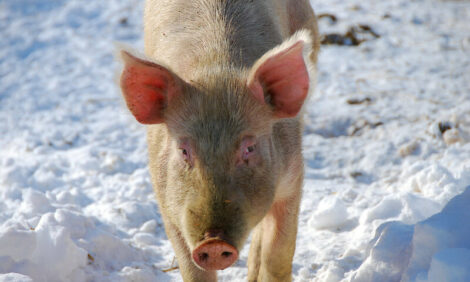



Export ban eased, but cull market still a problem
UK - News that exports of pig meat can resume from parts of the UK is a small step on the road back to normality says the British Pig Executive (BPEX). However, a large proportion of the industry is still out in the cold says BPEX chief executive Mick Sloyan.
Although the return of exports is welcome news there is still a massive problem with cull sows - a market that will remain mostly untouched by Defra's latest decision.
The European Standing Committee on the Food Chain and Animal Health (SCoFCAH) voted yesterday to lift the ban, imposed following the foot-and-mouth disease (FMD) crisis. Defra has since announced exports of meat and meat products can begin again from 12 October, once the UK is split into three areas or 'risk'. However, this is dependent on there being no further outbreaks or foot and mouth disease, says Defra.
Exports are to be allowed from the designated FMD Low Risk Area - limited trade. Reports suggest the counties of Dorset, Somerset, Gloucestershire, Herefordshire, Worcestershire, Staffordshire, Leicestershire, Rutland, Cambridgeshire and Norfolk and any to the south-east of them will still be restricted. However areas further north and west will be able to return to exporting meat, subject to strict conditions.
Those conditions include that meat must be from animals that have been on the same holding for at least 30 days before slaughter and that no foot and mouth susceptible animals have been introduced to the holding during the previous 21 days. The meat must also be held by the abattoir for at least 24 hours before dispatch.
Not all good news
Mr Sloyan said that while this is good news for those in the low risk area it is not so good for the rest - which amounts to some 48 per cent of the English breeding herd.
“The problem of cull sows still remains. The key abattoirs that slaughter them are in the high risk area and virtually all the meat is normally exported to Germany. There simply isn't a market for it in this country and at the moment it can't go anywhere else."
The British Meat Processors Association (BMPA) cautiously welcomed the decision although said the move was only of limited value and more of a 'token' gesture.
The European Standing Committee on the Food Chain and Animal Health (SCoFCAH) voted yesterday to lift the ban, imposed following the foot-and-mouth disease (FMD) crisis. Defra has since announced exports of meat and meat products can begin again from 12 October, once the UK is split into three areas or 'risk'. However, this is dependent on there being no further outbreaks or foot and mouth disease, says Defra.
Exports are to be allowed from the designated FMD Low Risk Area - limited trade. Reports suggest the counties of Dorset, Somerset, Gloucestershire, Herefordshire, Worcestershire, Staffordshire, Leicestershire, Rutland, Cambridgeshire and Norfolk and any to the south-east of them will still be restricted. However areas further north and west will be able to return to exporting meat, subject to strict conditions.
Those conditions include that meat must be from animals that have been on the same holding for at least 30 days before slaughter and that no foot and mouth susceptible animals have been introduced to the holding during the previous 21 days. The meat must also be held by the abattoir for at least 24 hours before dispatch.
Not all good news
Mr Sloyan said that while this is good news for those in the low risk area it is not so good for the rest - which amounts to some 48 per cent of the English breeding herd.
“The problem of cull sows still remains. The key abattoirs that slaughter them are in the high risk area and virtually all the meat is normally exported to Germany. There simply isn't a market for it in this country and at the moment it can't go anywhere else."
The British Meat Processors Association (BMPA) cautiously welcomed the decision although said the move was only of limited value and more of a 'token' gesture.








